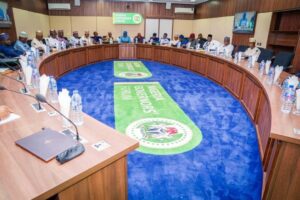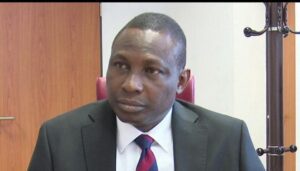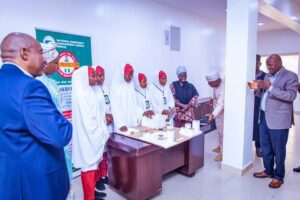
Challenges Ododo must confront to move Kogi state forward
Usman Ododo was over the weekend sworn in as the governor of Kogi State. He was declared winner of the 2023 governorship election in the State. Ododo, a member of the All Progressives Congress (APC) succeeds Yahaya Bello as Kogi governor. Ododo took his oath of office as the 5th Kogi governor, in Lokoja, the state capital on Saturday, following his November 11 victory.
He got 446,237 votes, defeating his closest rival, Murtala Ajaka of the Social Democratic Party, SDP, who garnered 259,052. In that election, Dino Melaye of the Peoples Democratic Party (PDP) pulled 46,362 votes.
Speaking after the swearing in, Ododo appreciated his predecessor, Bello, and promised not to disappoint the people of the State.
However, based on his promise, not to disappoint the people, it is important for Ododo as governor to take note of where the State currently is in terms of strength and weaknesses, which remains important for him to comprehend situations necessary to set priorities and deploy resources as appropriate.
Ododo’s predecessor, Yahaya Bello, served for two terms as constitutionally allowed. Yahaya Bello became the governor of Kogi State in 2015 after he was chosen by the All Progressives Congress (APC) as a replacement for the late Abubakar Audu, who originally won the election but died before the result was announced.
Under Bello, the economy had its sides of records which may not be said to reach target. Although the 2022 State of States report by BudgIT put the estimated GDP of the state at 3.69 trillion, ranking as the third state in the North-central with the largest GDP, yet among the 36 States, it is the 16th with the largest GDP. On a per capita basis, using the state’s 4.44 million population, the GDP per capita was pegged at N830,788, the highest in the North-central region.
On Internally generated revenue (IGR) in Kogi State, an analysis of the IGR and total allocations from the Federation Account Allocation Committee (FAAC) shows that the state is heavily reliant on FAAC allocations even though there was an annual increase in the state’s IGR.
Between 2015 to 2022, Kogi State’s total revenue (IGR plus FAAC) was a little above half a trillion naira (N506.78 billion). Of this amount, IGR was only N114.87 billion, representing 23 percent, while FAAC allocation accounted for 77 percent, clearly indicating that the state relied heavily on FAAC disbursements within these periods for survival.
The implication of this is if allocation from the central government is cut off, the state may not be able to meet its basic obligations, such as payment of salaries, wages, pensions, and even providing other important social services and infrastructures.
Thus, the task before Ododo is to think of more innovative ways to increase its internal revenue and rely less on allocations from Abuja. This will help to improve its fiscal sustainability.
The state has shown little improvement in the annual ranking done by BudgIT on fiscal sustainability. However, there’s still room for improvement as the state is still ranked among the bottom 10 states on fiscal sustainability. More so, its performances in 2017 and 2018 are still far better than its recent ones.
In the last six years, BudgIT has assessed the fiscal sustainability of all 36 states in Nigeria using indices such as the ability of the state to cover its operating costs solely with its IGR, its ability to meet all operating expenses and loan repayment obligations without resorting to borrowing, its debt sustainability, and its emphasis on capital expenditures over recurrent expenses.
In the 2017 report, Kogi State ranked 17th place out of 36 states in terms of fiscal performance. It was the third best among its peers in the North-central region, just below Niger and Kwara States.
The following year, the state dropped from 17th to 21st position. But still retained its 3rd position among its peer in the North-central.
The state’s performance further dropped in 2019. In fact, it ranked as the worst state in the 2019 fiscal performance ranking.
In the 2020 report, the state climbed 7 places to 29th position. Since then, there has been a climb every year, emerging 27th place in the 2022 ranking. Nevertheless, it is still among the bottom states with the lowest fiscal performance in the country.
On its debt, Kogi State, as of 2022, was the 14th least indebted state in Nigeria with respect to domestic debts.
According to the data from the Debt Management Office (DMO), Kogi’s domestic debt at the end of 2022 was N93.62 billion, an increase from the 2021 figure, while on foreign debt, the state’s foreign obligations dropped to $55.20 million from its previous $55.99 million.
From the data, the Yahaya Bello administration leaned towards more domestic borrowing in the period under review because while the state’s domestic debt increased significantly for the most part of the years under review, the external debt remained almost the same between 2015 to 2021.
Ododo must be prudent in terms of borrowing, while deploying strategic debt management mechanisms.
In terms of unemployment rate, in 2016, Bello had promised that his administration would tackle the issue of unemployment in the state. Specifically, he promised that the blueprint his administration has come up with would create one million jobs for the youths in the state. Thus, reducing unemployment.
According to the data from NBS, at the end of the fourth quarter of 2017, Kogi State had an unemployment rate of 17.6 percent. The second lowest in the North Central region, just below Benue’s 17.4 percent, and the 12th among the 36 states and Federal Capital Territory (FCT).
The unemployment rate increased to 19.7 percent in Q4 2018. The worsened in Q4 2020, with the unemployment rate pegged at 39 percent, according to the data from NBS.
Under the Yahaya Bellow administration, Kogi State’s unemployment rate rose from 17.6 percent in 2017 to 39 percent in 2020.
Ododo must devise strategic interventions to address the rising unemployment rate in the State.
Also on the economy, in 2016, Bello had stated that with the abundance of mineral resources, Kogi State has, there shouldn’t be anything like poverty in the state. Thus, he promised that his administration would match ideas with resources to improve the state.
Well, from the data available, the poverty rate in the state is still on the high side. According to the 2019 Nigeria Poverty and Inequality Report by NBS, Kogi State had a poverty rate of 29 percent as of 2019. This means that 29 percent of the state’s population was living below the poverty line.
Then, the NBS used an actual per capita expenditure of N137,430 per year (or N376.50 per day) to measure Nigeria’s poverty rate. The state fared relatively well compared to its peers in the North-central region. It had the second lowest poverty rate in the region, while it was the 14th lowest among the 35 states that were assessed.
In 2022, the NBS released the National Multidimensional Poverty Index (MPI) report, which assessed poverty using four dimensions: health, education, living standards, and work and shock.
The report puts the poverty rate in Kogi State at 61 percent, indicating that more than half of the population is now living in multidimensional poverty. This is a significant increase compared to the less than 30 percent of the population which was living below the poverty line in 2019. Also, the state is no longer the second with the lowest poverty rate in the North-central region.
The Ododo government must work strategically to address issues of poverty in the state.
On ease of doing business ranking, in 2021, the Presidential Enabling Business Environment Council (PEBEC) published a report which assessed the 36 states and FCT on ease of doing business. The report ranked Kogi State 22nd out of the 36 states and FCT in terms of ease of doing business with a score of 5.22 out of the 10 index score.
The four indicators that were used in the 2021 ranking were Infrastructure and Security, Transparency and Access to Information, Regulatory Environment, and Workforce Readiness.
These indicators were expanded to six in the 2022 ranking.
Kogi State ranked 34th place in the 2022 report on ease of doing business, falling from its 2021 ranking. With a 4.97 score which is below the national average, Kogi State is ranked among the 5 states with the worst business environment in the country. Ododo’s government must look into this critical part.
On social issues, the number of out-of-school children in the North has been a major issue. For the state, according to data published by NBS in 2018, 124,290 lacked access to education in Kogi State. Out of this figure, girls accounted for 70 percent, while boys made up 30 percent.
With 124,290 out-of-school children, Kogi State had the second lowest out-of-school children in the North-central region and the 9th nationally. While no recent figures have specifically been given for the State, an increase in national records may not leave Kogi state out, hence the new government must work to tackle the rate.
On health, for under-five mortality, the 2020 NBS women and men report, as of 2018, Nigeria had an under-5 mortality rate of 132 deaths per 1,000 live births, indicating that 132 out of every 1,000 children born would die before age 5.
The Under 5 mortality rate in Kogi State was put at 148, higher than the national rate of 132, making it the 9th state with the highest under-5 mortality rate in the country.
However, the state has recorded some improvement in this indicator. The Multiple Indicator Cluster Survey (MICS) released in 2022 put the under-5 mortality rate at 67 deaths per 1,000 live births, an improvement from its 148 rate in 2018.
While this improvement is noteworthy, it is important to emphasise that the state is still far from achieving the United Nations Sustainable Development Goals (SDGs) target of 20 deaths per 1,000 live births. Thus, there is a need for the Ododo government to develop and implement additional policies and strategies to reduce under-5 mortality further and work towards achieving this goal.
On security, the Ododo government must work strategically to build a strong security network to tackle the rising security menace in the State.
Recently, the Kogi State House of Assembly had expressed grave concern over the spate of insecurity challenges being experienced across the state, even as it confirmed the kidnapping of six persons in the Yagba East Local Government Area of the state under three weeks.
The member representing Yagba East in the Kogi State House of Assembly, Emmanuel Obaro, had moved a motion of urgent public importance on the floor of the House in Lokoja.
Obaro who could not ascertain whether the kidnapped victims have regained their freedom bemoaned the alarming issue of kidnapping and armed robbery which he said were fast spreading within his constituency and creating ripple effects that could harm individuals, families and engulf the entire environment with fear and uncertainty, especially across the various communities in the Yagba East Local Government Area.
The lawmaker had thus called on the State Government to investigate the increasing cases of armed theft and kidnapping with a view to identifying the individuals involved, their modus operandi and areas of operations with a view to putting an end to the same.
Addressing insecurity in the State is essential for all round development because business can only thrive where security risk is lower, a profile which the present records in the State does not project. In all, to keep to his promise not to disappoint the people of Kogi State, Ododo has a huge task ahead of him.



